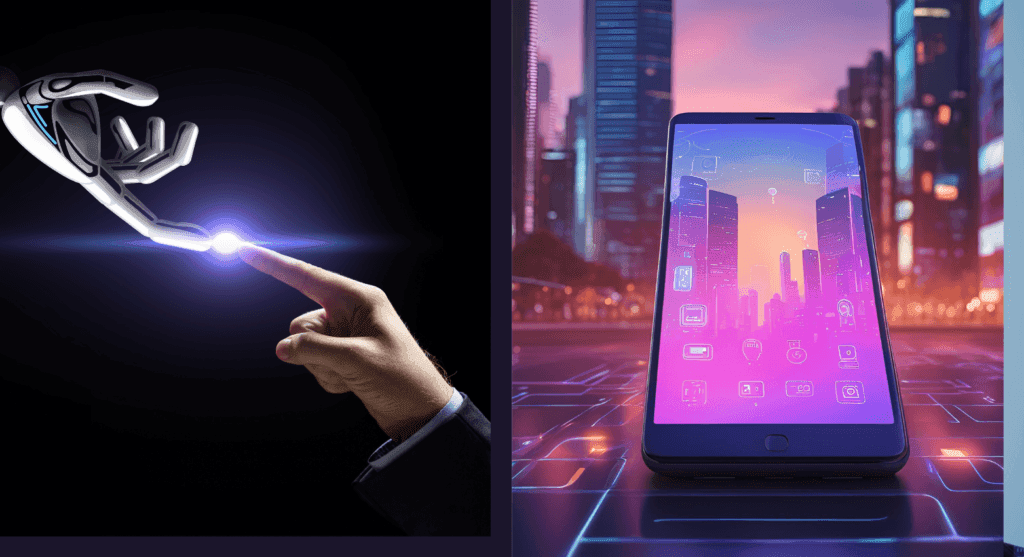“Explore how AI is revolutionizing smartphones, from better photos and longer battery life to smarter assistants.” Compare the AI capabilities of the most recent iPhone and Samsung handsets and discover what distinguishes them in the ever-changing digital market.
The goal of artificial intelligence (AI) is to enable robots to think and act in ways that are similar to human intellect. Consider a technology that can learn from experience, solve issues, grasp language, and even make sense of difficult circumstances like we do. AI accomplishes this by analyzing large volumes of data, identifying patterns, and making sound conclusions.

Its actual essence is the replication of human-like cognitive capacities within computers, allowing them to face complex difficulties, adapt constantly, and get smarter with each interaction. This technology is about more than just automating chores; it is about pushing the limits of what is possible, increasing human potential, and redefining how we live and work in a constantly changing environment.
AI in phones
Artificial intelligence (AI) is changing how we interact with smartphones, so it’s no surprise that Apple and Samsung have included cutting-edge AI features in their flagship products. Let’s see how the iPhone 16 Pro Max AI compares to the latest Samsung Galaxy model, and what distinguishes each brand’s approach to AI.
Apple iPhone 16 Pro Max: AI that’s Intuitive and Seamless
Source :-www.apple.com
Apple has long been about making technology feel effortless, and the AI in the iPhone 16 Pro Max exemplifies this idea
The iPhone 16 Pro uses AI-powered computational photography to improve image quality. It intelligently adjusts factors like exposure, colour balance, and noise reduction in real-time, making every photo more colourful and lifelike, even under difficult lighting situation.
The iPhone 16 Pro has better AI integration, resulting in a more context-aware Siri and improved on-device processing for capabilities such as Apple real-time language translation, predictive text, and personalized app suggestions, making everyday tasks faster and more intuitive.
The iPhone’s A18 Bionic chip uses AI to make every interaction more fluid and natural.
The AI-enhanced camera system can now assess and alter over a billion characteristics in real-time, guaranteeing that each photo is balanced, vivid, and clear.
AI is not only confined to visuals. Apple has used its Neural Engine to understand user behaviour and minimize battery consumption.
Over time, your iPhone learns when you are most likely to use specific apps and optimizes its power consumption appropriately, giving you extra battery life when you need it the most. Even the familiar Face ID has been made faster and more secure by AI, resulting in a seamless yet comprehensive security experience.
Overall, AI in the iPhone 16 Pro Max focuses on subtle, behind-the-scenes modifications that improve the device’s usability and responsiveness.
It is an artificial intelligence system designed to improve your daily life without interfering with it.
Also Read:-Iphone16 Pro
The Samsung Galaxy S24 Ultra: AI that pushes the boundaries
In contrast, Samsung’s Galaxy S24 Ultra approaches AI with a focus on performance.
The Samsung Galaxy S24 Ultra has advanced AI algorithms that maximize photography performance by automatically recognizing scenes, improving color accuracy, and minimizing noise. Its AI Super Resolution function sharpens details and improves zoom capabilities, letting users to shoot distant scenes with incredible clarity. The S24 Ultra employs artificial intelligence to maximize battery life by learning user habits and dynamically changing power consumption. This results in a longer battery life, allowing the gadget to remain powered even during heavy use.
Samsung’s AI is immediately seen in its photographic capabilities, which enable game-changing features like Super Resolution Zoom and better night mode.
The AI here does more than just increase image quality; it entirely transforms the camera’s functionality, with real-time scene recognition and object tracking that allow you to capture spectacular shots regardless of lighting or movement.
Beyond the camera, Samsung AI enhances display performance and multitasking. Whether you are switching between apps or watching a movie, the AI adjusts the screen’s refresh rate and brightness to fit your activity, resulting in an immersive experience that is also battery-friendly.
Bixby, Samsung’s AI assistant, has also grown in intelligence and capabilities, now allowing for a variety of voice commands and smart routines that can quickly automate daily tasks.
Evaluation and Comparison
The newest Galaxy A model from Samsung and the iPhone 16 Pro Max both use artificial intelligence (AI), but Samsung uses it to modernize camera technology and adaptable performance, whereas Apple focuses on advanced photography and ecosystem integration.
My Apple AI prioritizes user privacy and experiences, but Samsung’s AI excels at improving hardware functionality and providing dynamic, flexible responses to human input.
Apple’s AI functionality is firmly embedded into its ecosystem, enabling smooth interactions between the iPhone, iPad, Mac, and other devices. AI is used in features like handoff, universal control, and continuity cameras to create a consistent user experience across devices. In contrast, Samsung’s AI focuses on device-level optimization, such as the AI-powered DeX mode, which transforms the phone into a desktop-like experience, but it lacks the cross-device capabilities of Apple’s ecosystem.
Apple prioritizes user privacy by doing the majority of AI-related functions natively on the device, such as Siri voice recognition and photo categorization, hence lowering dependency on cloud processing. Samsung, on the other hand, uses cloud-based AI for some of its advanced features, such as Bixby’s deep learning capabilities and language translations, possibly expanding capability but taking a different approach to data privacy and security.
All things considered, AI remains a crucial differentiator, allowing both manufacturers to create smarter, more personalized, more intuitive experiences, raising the bar for top handsets.